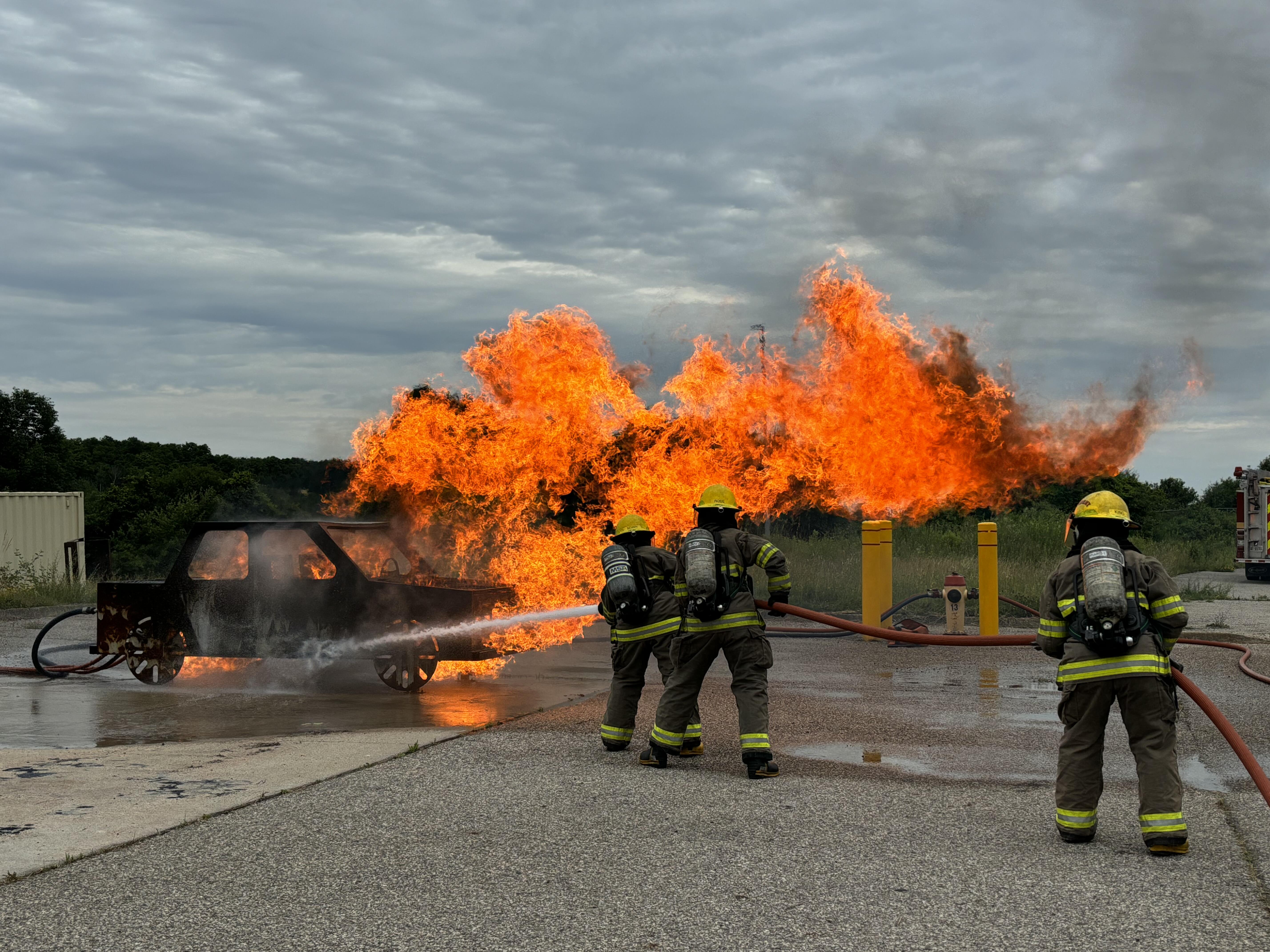Conestoga’s Pre-Service Firefighter Education and Training program provided support to a City of Kitchener camp offering teenage girls the chance for hands-on learning about a career in the fire service.

Students in Conestoga’s Pre-Service Firefighter Education and Training program demonstrate how to put out a car fire to participants in the City of Kitchener's Female Firefighter in Training camp.
Faculty and students from the program, along with college equipment including a pump truck and virtual-reality rescue simulations, joined the four-day Female Firefighter in Training (FFIT) camp held June 25-28 at the region’s emergency services training centre in Waterloo.
Two faculty and eight students volunteered their time to lead the platoons of 24 young women ranging in age from 15 to 19 at the camp, run by 40 staff from the Kitchener Fire Department. The camp is also supported by Fire Service Women Ontario with its mission to encourage, educate and empower women in Ontario’s fire service - a good fit with Conestoga’s mandate to encourage women to consider traditionally male-dominated professions, including firefighting.
“It has been our pleasure to be an ongoing part of the Kitchener Fire Department program to allow young women to participate in the training that we do in our Pre-Service Firefighter program to show them what it's like,” said Darrell Reis, fire grounds technologist.
“As a result of these camps, we have gained a number of new women students into our program. This has been a success for both the Kitchener Fire Department and Conestoga as well.”
This is the 13th year for the program, now in its third year run as a four-day camp.
“The goal of Kitchener Fire’s Female Firefighter in Training camp is to educate and empower young women to explore a career in fire services, with a chance to gain first-hand experience with firefighting scenarios,” said Beverly Bradley, 1st Class Firefighter with Kitchener Fire.
“We appreciate the volunteer support provided by Conestoga students and faculty in assisting with these exercises and mentoring the camp participants who may be considering the pre-service firefighter program as a next step in their career pursuits.”
The campers were put through their paces over the four days of physically and mentally demanding activities, including a vehicle extraction while outfitted in all the protective gear and rappelling down an eight-storey tower at the training centre.
The final day included female Conestoga firefighting students demonstrating how to tackle a vehicle fire, quickly taming the flames shooting up into the sky and briefly warming the teens watching from a safe distance.
Campers also got to practice what they were learning in virtual rescue scenarios with equipment from Conestoga’s globally recognized Virtual and Augmented Reality Lab (VARLab).
These same simulations are used by Conestoga students, allowing them to put their training into action but in the safety of a virtual environment. In class, the students will work together in the same scenario while outfitted with their radios to also practise communication as they put out fires and rescue victims.
Conestoga student Amber King wishes she could have joined the camp when she was a teenager, and likely she would have gone straight into the pre-service firefighter program rather than take a detour into nursing studies before realizing that wasn’t the career for her.
The camp gives the participants a hands-on understanding of what it takes to be a firefighter. That includes finding out the fitness level firefighters need to haul and wield all the weighty equipment and, of course, remove any victims from harm’s way.
“It’s great. It’s exactly what we do day to day in school,” King said. “Now they know what it’s like.”
Conestoga’s Pre-Service Firefighter Education and Training program provides strong pre-service preparation for people seeking a career with today’s and tomorrow’s fire services. The curriculum provides the knowledge, skills, and professional development for success as a fire services recruit, and the foundation for further career progression opportunities in this important area of public safety. With a focus on professionalism, integrated skills acquisition through simulation-based training and inter-professional collaboration, students build towards internationally recognized credentials (National Fire Protection Association).
